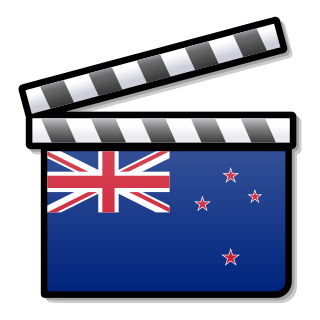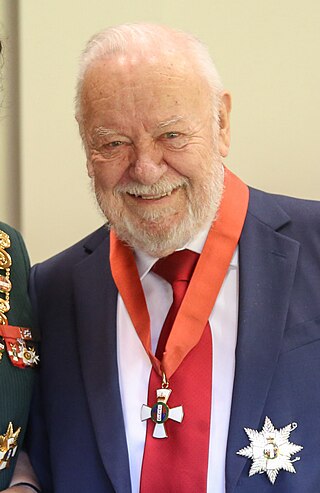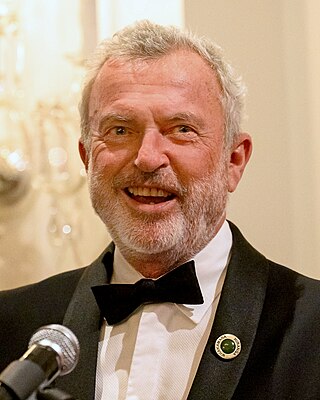Related Research Articles

New Zealand cinema can refer to films made by New Zealand-based production companies in New Zealand. However, it may also refer to films made about New Zealand by filmmakers from other countries. Due to the comparatively small size of its film industry, New Zealand produces many films that are co-financed by overseas companies.

Geoffrey Peter Murphy was a New Zealand filmmaker, producer, director, and screenwriter best known for his work during the renaissance of New Zealand cinema that began in the second half of the 1970s. His second feature Goodbye Pork Pie (1981) was the first New Zealand film to win major commercial success on its soil. Murphy directed several Hollywood features during the 1990s, before returning to New Zealand as second-unit director on The Lord of the Rings film trilogy. Murphy was also a scriptwriter, special effects technician, schoolteacher and trumpet player at different times. He was married to Merata Mita, a film director, actor, writer.

Sir Ian Barry Mune is a New Zealand character actor, director, and screenwriter. His screen acting career spans four decades and more than 50 roles. His work as a film director includes hit comedy Came a Hot Friday, an adaptation of classic New Zealand play The End of the Golden Weather, and What Becomes of the Broken Hearted?, the sequel to Once Were Warriors.

David Charles Lawrence known as Bruno Lawrence was an English-born musician and actor, who was active in the industry in New Zealand and Australia.

Don McGlashan is a New Zealand composer, singer and multi-instrumentalist who is best known for membership in the bands Blam Blam Blam, The Front Lawn, and The Mutton Birds, before going solo. He has also composed for cinema and television.

Anthony Higgins is an English stage, film and television actor. His credits include A Walk with Love and Death (1969), Taste the Blood of Dracula (1970), Hadleigh (1976), The Eagle of the Ninth (1977), Love in a Cold Climate (1980), Quartet (1981), The Draughtsman's Contract (1982), Lace (1984), The Bride (1985), Young Sherlock Holmes (1985), Napoleon and Josephine: A Love Story (1987), Sherlock Holmes Returns (1993), Nostradamus (1994), Peak Practice (2000), Chromophobia (2005), Heroes and Villains: Napoleon (2007), Lewis (2009), Malice in Wonderland (2009), Bel Ami (2012), and Tutankhamun (2016).

Paul Allan Maunder is a New Zealand film director, playwright and cultural activist. He is best known for his 1979 film of the novel Sons for the Return Home by Albert Wendt, his 1983 play Hemi about the life of James K. Baxter, and his work in community-based theatre.
Alun Robert Bollinger is a New Zealand cinematographer, who has worked on several Peter Jackson films, and many other films in New Zealand. He has also been a Director of Photography, including the second unit for Peter Jackson's trilogy The Lord of the Rings. He started as a trainee cine-camera operator for television with the New Zealand Broadcasting Corporation in 1966.
Bryan Bruce is a New Zealand documentary maker and author.

Sir Nigel John Dermot "Sam" Neill is a New Zealand actor. Neill's career has included leading roles in both dramas and blockbusters. Considered an "international leading man", he has been regarded as one of the most versatile actors of his generation.
Merata Mita was a New Zealand filmmaker, producer, and writer, and a key figure in the growth of the Māori screen industry.
Shirley Frances Whitley Maddock was a New Zealand producer, television presenter, author and actress. After early work in theatre and radio, she became a pioneering figure in early New Zealand television. She produced and presented a number of award-winning documentaries, including New Zealand's first ever locally produced television documentary series, Islands of the Gulf (1964). Later in her career she wrote a number of non-fiction books about New Zealand's history and landscapes, worked as a book reviewer, and continued to make appearances on television and radio throughout the 1970s and 1980s.

Michael Haigh was a New Zealand actor, narrator and teacher.

Peter John Hayden is a New Zealand actor, and television series writer, producer and presenter. Hayden is known to New Zealand audiences as the writer and narrator of nature documentaries series including Wild South and Journeys Across Latitude 45.

Eric Vincent Burke was a New Zealand television and film producer. Burke was the founder of Top Shelf Productions which was established in 1988. With a career spanning thirty years, Burke was noted for his documentary work and television productions that addressed social issues and everyday life.
The Last Tattoo is a 1994 feature film set in World War II-era Wellington, New Zealand.
Country Lads is a 1941 New Zealand patriotic propaganda film. It was produced by the National Film Unit for the New Zealand war effort.
Journey for Three is a 1950 New Zealand black and white immigration propaganda film.
Wayleggo is a 1965 New Zealand short film. It was produced by the National Film Unit. The film was based on the 1947 musterer memoir Wayleggo written by Peter Newton.
The Te Kooti Trail is a 1927 New Zealand historic drama film about Te Kooti, based on a newspaper serial written by Frank Bodle. This silent film is described as New Zealand's first docudrama and was created by husband and wife team Rudall and Hilda Hayward.
References
- 1 2 "A Cinema of Unease A Personal Journey by Sam Neill". British Film Institute. 1995. Retrieved 29 January 2023.
- ↑ "TV Guide Film and Television Awards". Lonely.geek.nz. Retrieved 19 May 2021.
- ↑ "Cinema of Unease". NZ On Screen . Ngā Taonga Sound & Vision . Retrieved 5 August 2014.